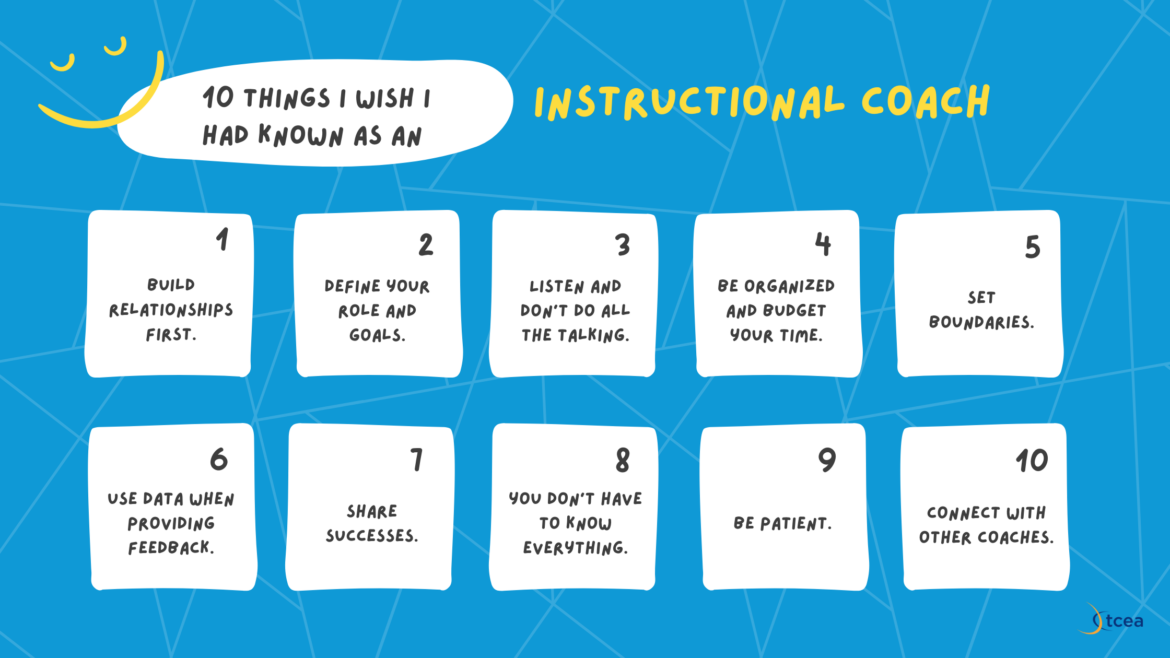Instructional coaching is an incredibly rewarding career, and each day can be filled with both excitement and challenges. When I think back to the time when I was an instructional technology coach, however, there are many things I wish I’d known then that would have made me better at helping educators improve professionally. Here are ten that I want to share with you.
1. Build relationships first.
Make sure teachers know that you are there to help them and not to “add to their plates.” Be open and honest, and let them know you are genuinely there to support them. Many times, team teaching helps to build those relationships and helps you get a foot in the door.
2. Define your role and goals.
Explain to teachers what your role is. The more teachers understand how you will be working together with them, the better. In addition, come up with a plan of action that will help guide your coaching.
3. Listen and don’t do all the talking.
Listen to your teachers and be attentive. Pay attention to what matters to them. Talk less during your coaching session and trust that your teachers will get what they need from the conversation by talking their way through it. You are there to facilitate their learning.
4. Be organized and budget your time.
Get a system in place where you can be organized. Think about scheduling. Whether you use Google Calendar or online tools like You Can Book Me, it is important to have online calendaring in place. In addition, think about how you will get information out to your teachers.
5. Set boundaries.
As a coach, your instinct is to help everyone. You will want to please everyone. Sometimes you must learn to say “no” in order to not overextend yourself. You might even have to find creative ways to say, “That’s not my job.” Plus, we have to be honest and admit that there are some teachers that may not be ready for our help.
6. Use data when providing feedback.
Using data is a way to be objective when providing feedback. Have something to base your coaching on that will give you focus and make feedback more objective and meaningful to the teacher. Regardless of the tool, using data will hep provide concrete evidence of progress.
7. Share successes.
It is very important to build on the positive. This will encourage teachers. Notice what is going well, share it, and then build on it.
8. You don’t have to know everything.
As a coach, you must come to terms that you don’t have to know everything and, in fact, can’t possibly know everything. It is okay to learn from the teachers you coach. Every day can be a learning experience. Let teachers know up front that you don’t have all the answers, but that you will do your best to find out.
9. Be patient.
Know that it might take some time for some teachers to warm up to you. You must be patient because it won’t happen overnight. Try to get at least one teacher from each grade level or subject area to work with in the beginning. Then, give it time to grow as those teachers will then share with their peers.
10. Connect with other coaches.
Network with other coaches to get support along the way. Being able to share and bounce ideas off each other, share materials, or just help work through an issue can be so beneficial.
Please share what you wish you had known as an instructional coach in the comments below.




3 comments
A vey precise and informative article to understand the efficacy required to progress as an instructional coach.
Such good advice Diana! One of my greatest privileges as an educator was helping supervise instructional coaches. The good ones followed this advice. I especially like the tip to build relationships first. This is the foundation for good teaching and coaching. Thanks for sharing!
I absolutely loved your post! I am new to coaching 🙂